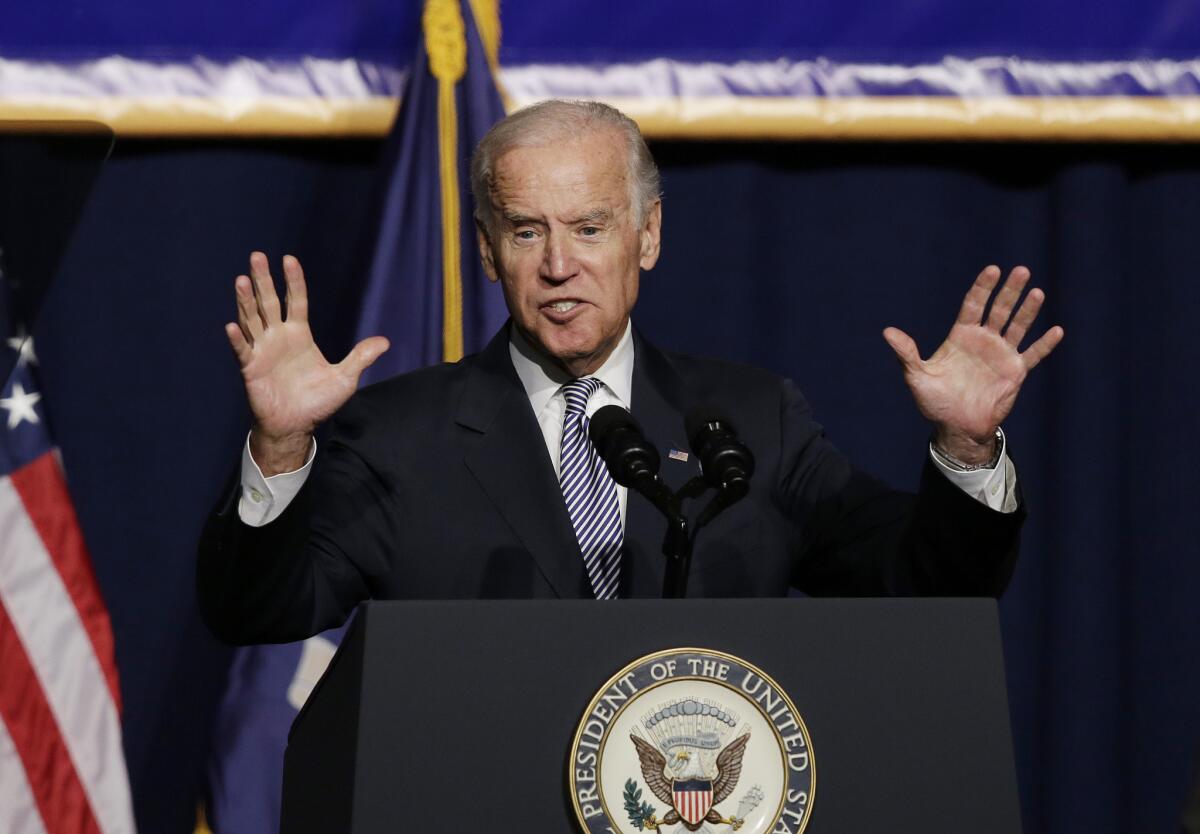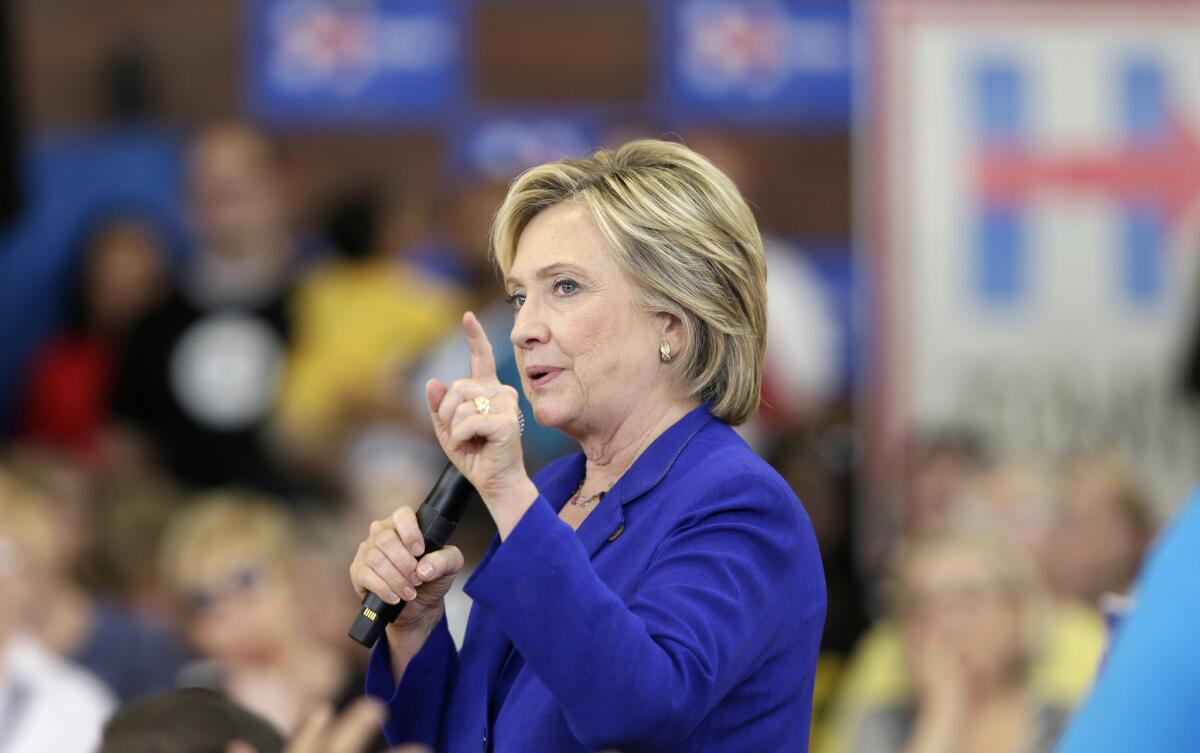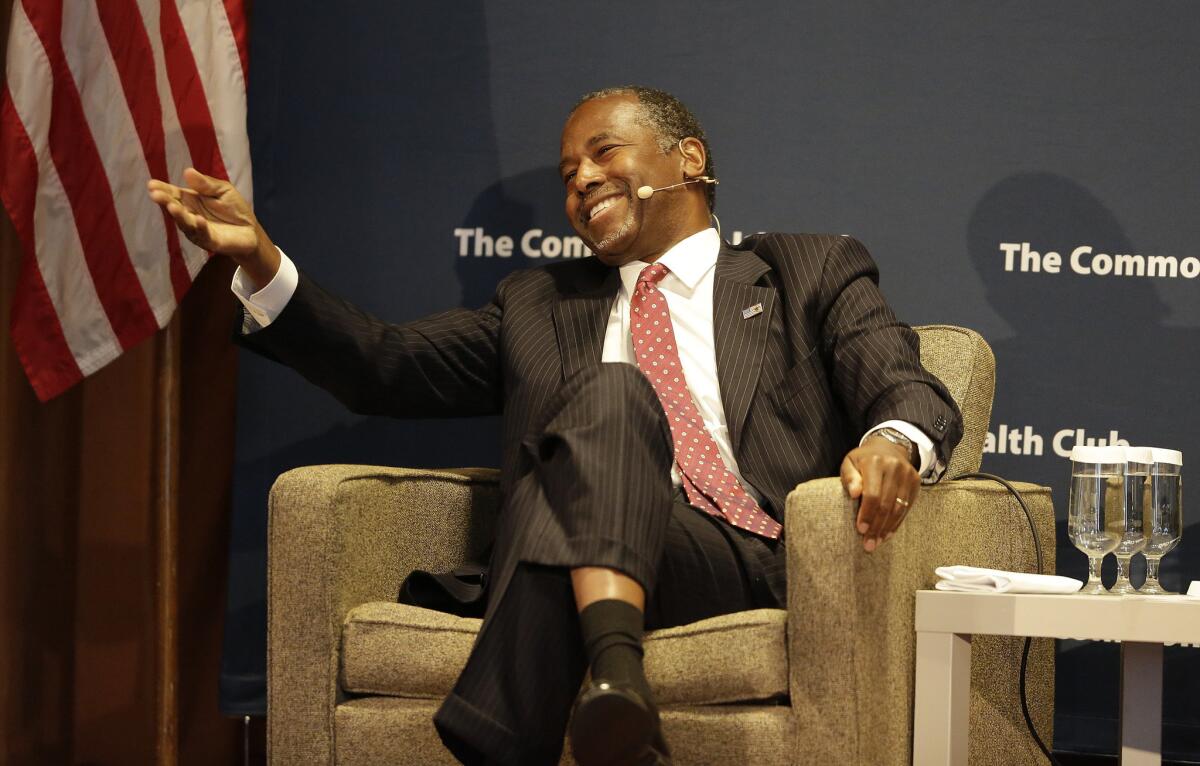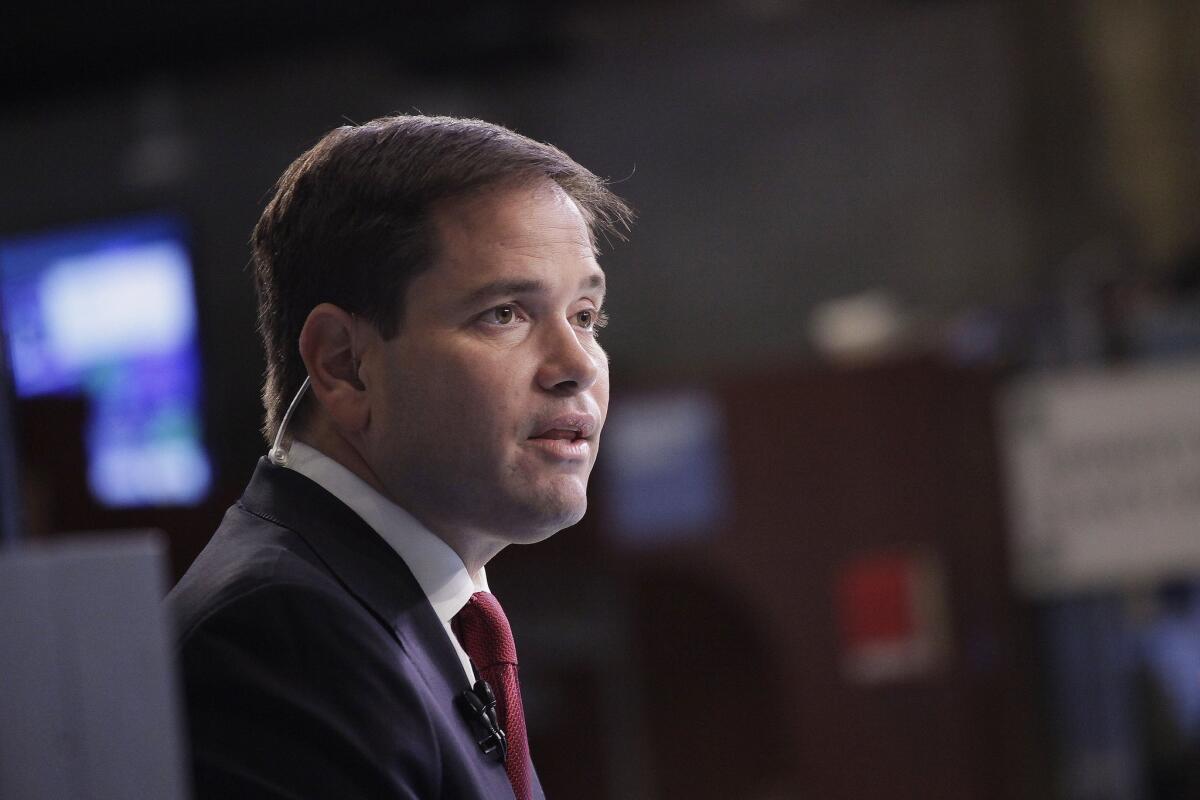Joe Biden doesn’t want ad invoking family’s deadly car wreck to air, source says
- Share via
By the numbers
Welcome to Trail Guide, your daily host through the wilds of the 2016 presidential campaign. It's Thursday, Oct. 8, and this is what we're watching:
- Vice President Joe Biden hopes a new ad invoking the accident won't air, the Times' Michael A. Memoli reports
- Rupert Murdoch, who may be the most influential media mogul in conservative politics, tries to retreat from his dig at President Obama
- Ben Carson talks about encountering a gunman at a Popeye's
- Marco Rubio grew up in Nevada picketing for better wages and persuading his family to become Mormon, the Times' Lisa Mascaro reports
Source: Biden hopes new Draft Biden ad won't air

Vice President Joe Biden speaks at a labor rally Sept. 10, 2015 in New York.
Vice President Joe Biden hopes that a new ad from unaffiliated supporters promoting his potential presidential candidacy does not air, a person close to him said Thursday.
Draft Biden, a super PAC independent of Biden and seeking to draw him into the 2016 race, announced Wednesday that it was launching a six-figure national television ad campaign with a dramatic 90-second spot that recalls the 1972 car accident that claimed the life of Biden's wife and infant daughter and seriously injured his two sons.
It features Biden's own words, as he addressed a gathering just weeks before his eldest son, Beau, died in May of cancer. Biden reflected during the remarks on how his "whole world was altered" by the car accident, just weeks after he was first elected to the Senate.
"The incredible bond I have with my children is a gift I'm not sure I would have had had I not been through what I went through," Biden is heard saying, as a montage of black-and-white photos of him and his family plays. "But by focusing on my sons, I found my redemption."
The ad closes with text on screen saying: "Joe, run."
The ad has not aired on television, though portions of it appeared on cable news during discussions of it. Now, Biden is saying he hopes it won't air.
"The vice president appreciates that they are trying to help," the person close to the vice president said. "But he has seen the ad and thinks the ad treads on sacred ground and hopes they don't run it."
The vice president's office declined to comment.
In a statement, the super PAC said it would "honor his wishes" and pull the ad.
"Nobody has more respect for the Vice President and his family than we do," senior advisor Josh Alcorn said in a statement.
Draft Biden had said the ad was intended to tell the story of how Biden "developed his incredible sense of empathy and connection with the American people." It was produced and conceived by Mark Putnam, a leading Democratic media consultant who worked on Biden's 1988 presidential campaign.
Its ad is one of several factors beyond Biden's control intruding on his deliberations about whether to run for president. The outside rumination on his tragic personal history had the inadvertent effect of giving his grief an off-putting veneer of opportunism. The White House has been deferential but has increasingly hinted that it is ready to move on. And talk has eased about a collapse by Democratic front-runner Hillary Rodham Clinton, which would help Biden's chances for the nomination.
The outpouring of sympathy for Biden after Beau's death, and the admiration of many for the way he has conducted himself publicly since, has certainly enhanced the vice president's public image in a way that could serve a potential campaign.
But just a day before the Draft Biden ad was announced, Politico reported that it was Biden himself who told a New York Times columnist months earlier that his son's dying wish was for him to run. The report cast the revelation as evidence of political calculation by Biden, a characterization the vice president's office called "offensive."
"The bottom line on the Politico story," the vice president's office said in a statement, "is that it is categorically false."
On immigration, Democrats move left, GOP right, poll shows
American views on immigration have grown more polarized, with Republicans taking harder-line positions as Democrats and independents take more liberal stands, a new poll indicates.
The shift can be seen on several issues, including whether children born in the U.S. to people in the country illegally should be eligible for citizenship. Over the last nine years, Democrats have become steadily more supportive of so-called birthright citizenship, which is guaranteed by the Constitution's 14th Amendment. Republicans have become slightly more opposed to it, according to polling by the nonpartisan Pew Research Center.
Ahead of debate, Clinton unveils aggressive Wall Street agenda

Democratic presidential candidate Hillary Rodham Clinton speaks in Des Moines last week. Another group of private emails from her tenure as secretary of State has been released.
Hillary Rodham Clinton has struggled to convince progressive that she is as determined as they are to change the culture of Wall Street, and Thursday she sought to reassure them with aggressive plans for regulating the financial sector.
The Clinton Wall Street agenda, unveiled in the form of a detailed policy paper , is notable for the candidate's vow to push very specific policies that are not likely to be received well in the brokerage firms and investment banking houses of New York, many of which have close ties to the Clintons. It is bold, reflecting a shift in thinking among even rabidly pro-growth Democrats about the kinds of changes that are needed to stem income inequality. It also calls for much more aggressive regulation than exists under the Obama administration.
But it is unlikely to nudge supporters of Clinton's chief primary rival, Vermont Sen. Bernie Sanders, into changing their allegiance. The Sanders plan is bolder.
"To prevent irresponsible behavior on Wall Street from ever again devastating Main Street, we need more accountability, tougher rules and stronger enforcement," Clinton said in a statement. "We can't go back to the days when Wall Street could write its own rules."
The Clinton plan focuses on curbing "excessive risk taking." Financial firms whose massive size creates a financial risk for the country-- the "too large to fail" phenomenon -- would be required to reorganize, downsize or be broken up. New "risk fees" could also be imposed on such firms. The plan addresses the widespread anger among progressives over the lack of prosecutions on Wall Street in the aftermath of the financial crisis with new provisions that would empower prosecutors to more easily punish bad actors.
Clinton also targets high-frequency traders, whose activity destabilizes the market, with a new tax. And she vows to boost oversight of "shadow banks" -- financial firms providing banking services but sidestepping the regulations banks operate under. And she promises to mount a spirited defense of the Dodd-Frank financial reform law amid Republican efforts to weaken it. One of the bill's authors, former Rep. Barney Frank (D-Mass.), praised the Clinton plan in the statement her campaign issued.
But there is one key proposal that progressives are demanding that is not in the Clinton plan. They want to revive the Glass-Steagall Act, which for decades prohibited big banks from taking part in investment banking. A reinstatement of those rules, which were changed when Bill Clinton was in the White House, would in effect force a breakup of the nation's big banks. Sanders is a champion of Glass-Steagall, which he argues could have helped the nation avoid the financial crisis.
Scene in Las Vegas at Trump rally
Ben Carson recounts gun incident ... at a Popeyes

Republican presidential candidate Dr. Ben Carson, who spoke Tuesday in San Francisco, has risen to second place in several polls of GOP primary voters who are drawn to his commitment to his faith and political-outsider status.
Ben Carson is talking about gun violence -- again.
Carson, who has faced a strong backlash for saying after the mass shooting at an Oregon community college that he would stand up to a gunman, recounted a time when a man did point a gun at him.
"I have had a gun held on me when I was in a Popeyes," he said in an interview Wednesday on Sirius XM radio.
Carson, a retired neurosurgeon, said he was frank with the assailant.
"Guy comes in, put the gun in my ribs. And I just said, 'I believe that you want the guy behind the counter,'" Carson said.
Carson's startling statement of his willingness to put someone else's life in danger came days after he said he would not "just stand there" and let a gunman shoot him, while speaking about the mass shooting at Umpqua Community College in Roseburg, Ore.
"Not only would I probably not cooperate with him, I would not just stand there and let him shoot me. I would say, 'Hey, guys, everybody attack him! He may shoot me but he can't get us all,'" he said in a recent Fox News interview.
The issue of gun control often comes to the forefront after mass shootings, with Democrats calling for stricter laws and Republicans, including Carson, maintaining that tougher reforms would not necessarily prevent massacres.
Carson, who also recently has said he would not like to see a Muslim as president, has remained steadily near the top of national polls as he seeks the Republican presidential nomination.
In an average of surveys in early nominating states, Carson, who has never run for elected office, trails only business magnate Donald Trump.
Carson has gained backing from voters in those states, including Iowa and South Carolina, that have large blocs of evangelical voters, in part because of his Christian faith. In recent weeks, he's sought to shore up support from evangelicals, talking more on the stump about his religion and even changing his Twitter profile picture to say #IamAChristian.
Donald Trump weighs in on Kevin McCarthy's exit from the race for House speaker
Rupert Murdoch tries to walk back his slight on Obama
Murdoch, the media mogul whose properties include Fox News and the Wall Street Journal, appears to write his tweets without the help of an advisor or a filter. His shot at Obama on Wednesday night drew a wave of criticism.
Which sports team owners are big players in 2016? Hint: LeBron has played for two of them
The owners of the Miami Heat and Cleveland Cavaliers did more than fight over the talents of LeBron James. They're also on opposite sides of the Republican presidential primary.
Heat owner Micky Arison dished out $500,000 to assist Jeb Bush, his state's former governor. Cavs owner Dan Gilbert sent $800,000 to New Jersey Gov. Chris Christie's super PAC, bypassing Ohio Gov. John Kasich. (Isn't Gilbert the guy who blasted LeBron for leaving his home state a few years ago to play for another team?)
There's a pretty big overlap between sports owners and super PAC donors. Not surprising. Buying a sports team and giving a politician a six-, seven- or eight-figure check require the same basic ingredients: great personal wealth, great personal ego and a love of competition.
Not every team boss sticks to a single candidate. Houston Texans owner Bob McNair has given $500,000 each to Bush, South Carolina Sen. Lindsey Graham, Texas Sen. Ted Cruz and Wisconsin Gov. Scott Walker, who put his campaign on waivers last month. Figures. His football team can't decide on a quarterback either.
Bush, who leads in most fund-raising categories, also leads in big backers from the sports world. In addition to his checks from McNair and Arison, he received $1 million from Charles Johnson (San Francisco Giants) and $500,000 from Robert Johnson (New York Jets).
But the most important political donor from the sports world doesn't own a team anymore. Norman Braman, former Philadelphia Eagles owner, has donated $5 million so far to Marco Rubio, making him the Florida senator's most important benefactor. Good thing he sold the team. Rubio is married to a Miami Dolphins cheerleader.
Hillary Clinton to raise money in Sacramento
Hillary Rodham Clinton will swing through California's capital city next month to scoop up some cash.
A fundraising luncheon on Nov. 4 is to be held at the home of prominent real estate developer Angelo Tsakopoulos, according to sources who requested anonymity because they were not authorized to comment on the campaign's plans.
Eleni Kounalakis, former U.S. ambassador to Hungary, is among the cohosts. Clinton supporters will pony up $2,700 -- the maximum an individual can give for the primary -- to attend.
Sign up here to get the Essential Politics newsletter in your inbox daily.
Meet the young Marco Rubio, who marched for better wages and went by Tony

He was known as Tony back then, a young boy so persuasive and self-assured that he helped convince his family to ditch Catholicism for the Mormon church, and marched in a union picket line with his dad, a casino bartender, to demand better wages.
Marco Rubio's life might have turned out very differently had he stayed in this working-class neighborhood off the Las Vegas Strip, where service workers like his father and mother, a hotel maid, dreamed of a better life while providing the labor to power the gambling industry's economic engine.
But the Rubios returned to Miami after six short but formative years in Nevada. Rather than coming of age in the small-L libertarianism of the West, where most Latinos skewed toward the Democratic Party, Tony began high school amid South Florida's conservative Cuban American exile community. And that's where Marco Rubio, early tea party favorite and Republican presidential hopeful, was forged.
By the numbers
Get the L.A. Times Politics newsletter
Deeply reported insights into legislation, politics and policy from Sacramento, Washington and beyond. In your inbox twice per week.
You may occasionally receive promotional content from the Los Angeles Times.







